2020 News/Events
October 9, 2020: Virtual Open House for Majors, Minors, and other Interested Students 
- Meet the Chair, Undergraduate and Graduate Directors,
Undergraduate Advisor, and other faculty members; - Learn about the Department of History, our curriculum and
degrees, as well as career paths for history graduates; - Ask any questions.
- WHERE: Microsoft Teams
October 9, 2020 | 2:30 to 3:30 pm - Join Microsoft Teams Meeting
2/27, 2020 Annual Lecture in Ottoman History: Vampire trouble is more serious than the mighty plague: A comparative look at the history of evil and mischief, inspired by Evliya Çelebi (1611–ca. 1684) by Cemal Kafadar (Harvard)
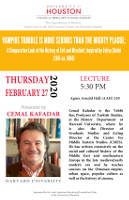 Cemal Kafadar is the Vehbi Koç Professor of Turkish Studies at the Department of History, Harvard University, where he is also the Director of Graduate Studies and Acting Director at the Center for Middle Eastern Studies (SMES). He has written extensively on the social and cultural history of the Middle East and Southeastern Europe in the Late Medieval/Early Modern era and he teaches courses on the Ottoman Empire, urban space, popular culture as well as the history of cinema.
Cemal Kafadar is the Vehbi Koç Professor of Turkish Studies at the Department of History, Harvard University, where he is also the Director of Graduate Studies and Acting Director at the Center for Middle Eastern Studies (SMES). He has written extensively on the social and cultural history of the Middle East and Southeastern Europe in the Late Medieval/Early Modern era and he teaches courses on the Ottoman Empire, urban space, popular culture as well as the history of cinema.
Time and location: 5:30 pm, AH 210.
Sponsored by the Arab-American Educational Foundation Chair at the University of Houston.
3/4, The Red Army's Encounter with the Holocaust by Dr. Vojin Majstorović (University of North Texas)
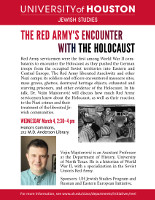 Red Army servicemen were the first among World War II combatants to encounter the Holocaust as they pushed the German troops from the occupied Soviet territories into Eastern and Central Europe. The Red Army liberated Auschwitz and other Nazi camps; its soldiers and officers encountered massacre sites, mass graves, ghettos, destroyed heritage objects, exhausted and starving prisoners, and other evidence of the Holocaust. In his talk, Dr. Vojin Majstorović will discuss how much Red Army servicemen knew about the Holocaust, as well as their reaction to the Nazi crimes and their treatment of the liberated Jewish communities.
Red Army servicemen were the first among World War II combatants to encounter the Holocaust as they pushed the German troops from the occupied Soviet territories into Eastern and Central Europe. The Red Army liberated Auschwitz and other Nazi camps; its soldiers and officers encountered massacre sites, mass graves, ghettos, destroyed heritage objects, exhausted and starving prisoners, and other evidence of the Holocaust. In his talk, Dr. Vojin Majstorović will discuss how much Red Army servicemen knew about the Holocaust, as well as their reaction to the Nazi crimes and their treatment of the liberated Jewish communities.
Time and location: 2:30 pm, Honors Commons, 212 M.D. Anderson Library.
Vojin Majstorović is an Assistant Professor at the Department of History, University of North Texas. He is a historian of World War II, with a specialization in the Soviet Union's Red Army.
3/18, Soviet Cultural Policy after Stalin by Rebecca Jonhston (UT Austin)
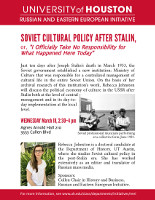 Just ten days after Joseph Stalin's death in March 1953, the Soviet government established a new institution: Ministry of Culture that was responsible for a centralized management of cultural life in the entire Soviet Union. On the basis of her archival research of this institution's work, Rebecca Johnston will discuss the political economy of culture in the USSR after Stalin both at the level of central management and in its day-today implementation at the local level.
Just ten days after Joseph Stalin's death in March 1953, the Soviet government established a new institution: Ministry of Culture that was responsible for a centralized management of cultural life in the entire Soviet Union. On the basis of her archival research of this institution's work, Rebecca Johnston will discuss the political economy of culture in the USSR after Stalin both at the level of central management and in its day-today implementation at the local level.
Time and location: Agnes Arnold Hall 210, 3553 Cullen Blvd.
Rebecca Johnston is a doctoral candidate at the Department of History, UT Austin, where she studies Soviet cultural policy in the post-Stalin era. She has worked extensively as an editor and translator of Russian mass media.
New Book by Cullen Professor Emeritus of History Martin Melosi
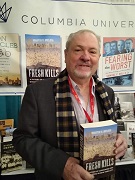 Congratulations to Professor Martin Melosi, The Hugh Roy and Lillie Cranz Cullen University Professor of History, for the publication of his most recent monograph, Frish Kills, with Columbia University Press! From the publisher's description: "Fresh Kills—a monumental 2,200-acre site on Staten Island—was once the world’s largest landfill. From 1948 to 2001, it was the main receptacle for New York City’s refuse. After the 9/11 attacks, it reopened briefly to receive human remains and rubble from the destroyed Twin Towers, turning a notorious disposal site into a cemetery. Martin V. Melosi provides a comprehensive chronicle of Fresh Kills that offers new insights into the growth and development of New York City and the relationship among consumption, waste, and disposal."
Congratulations to Professor Martin Melosi, The Hugh Roy and Lillie Cranz Cullen University Professor of History, for the publication of his most recent monograph, Frish Kills, with Columbia University Press! From the publisher's description: "Fresh Kills—a monumental 2,200-acre site on Staten Island—was once the world’s largest landfill. From 1948 to 2001, it was the main receptacle for New York City’s refuse. After the 9/11 attacks, it reopened briefly to receive human remains and rubble from the destroyed Twin Towers, turning a notorious disposal site into a cemetery. Martin V. Melosi provides a comprehensive chronicle of Fresh Kills that offers new insights into the growth and development of New York City and the relationship among consumption, waste, and disposal."
For more information about the book, visit the website of Columbia University Press.
Click here to download the newsletter.
2/19, The Experience of Laudianism in the Archdeaconry of Nottingham by Quentin Adams (UH)
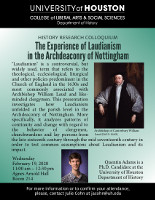 ‘Laudianism' is a controversial, but widely used, term that refers to the theological, ecclesiological, liturgical and other policies predominant in the Church of England in the 1630s and most commonly associated with Archbishop William Laud and like-minded clergymen. This presentation investigates how Laudianism unfolded at the parish level in the Archdeaconry of Nottingham. More specifically, it analyzes patterns of continuity and change with regard to the behavior of clergymen, churchwardens and lay persons from the late sixteenth century through the mid seventeenth century in order to test common assumptions about Laudianism and its impact.
‘Laudianism' is a controversial, but widely used, term that refers to the theological, ecclesiological, liturgical and other policies predominant in the Church of England in the 1630s and most commonly associated with Archbishop William Laud and like-minded clergymen. This presentation investigates how Laudianism unfolded at the parish level in the Archdeaconry of Nottingham. More specifically, it analyzes patterns of continuity and change with regard to the behavior of clergymen, churchwardens and lay persons from the late sixteenth century through the mid seventeenth century in order to test common assumptions about Laudianism and its impact.
Time and location: 11 am, AH 214.
Quentin Adams is a Ph.D. Candidate at the University of Houston Department of History.
